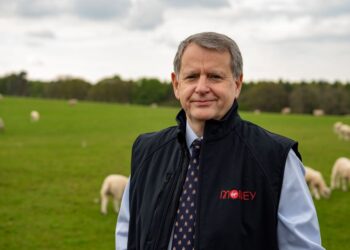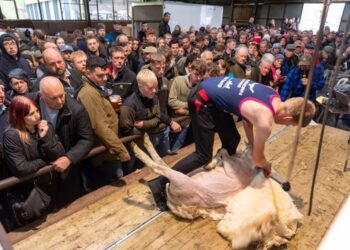Matterdale shepherd James Rebanks has written a warts and all account of what farming was like in his childhood and what it has now become, in his new book.
Rebanks, who lives and works at Racy Ghyll Farm, Matterdale, achieved worldwide acclaim for his number one best-selling debut, The Shepherd’s Life.
It has been translated into 16 languages and won the Lake District Book of the Year and was shortlisted for the Wainwright and Ondaatje prizes.
Of the sequel, entitled English Pastoral: An Inheritance, author Philip Pullman said: “Rebanks writes so well that I can’t imagine anyone starting to read it and not being eager to read it all at once, as I did, and not being moved by the life and the landscape he describes so well. I was thrilled by it.”
As a boy, Rebanks’s grandfather taught him to work the land the old way.
Their family farm was part of an ancient landscape — a patchwork of crops and meadows, of pastures grazed with livestock, and hedgerows teeming with wildlife.
And yet, by the time he inherited the farm, it was barely recognisable. The men and women had vanished from the fields; the old stone barns had crumbled; and the skies had largely emptied of birds.
English Pastoral is the story of an inheritance — it tells of how rural landscapes around the world have been brought close to collapse, and the age-old rhythms of work, weather, community and wild things are being lost.
And yet this elegy from the Lake District fells also carries a message of hope — how, guided by the past, a farmer began to restore the life that had vanished and to leave a legacy for the future.
This is a book about what it means to have love and pride in a place, and how, against the odds, it may still be possible to build a new pastoral.
It opens with him as a child, in a tractor with his grandfather, ploughing a 12-acre field on a limestone plateau that slopes down to the Eden Valley; with black-headed gulls following in their wake.
He writes: “There is a groan as metal scratches across the limestone bedrock.
“The tractor suddenly strains, engine toiling, like someone has dropped an anchor, then metal creaking, and stone breaking, and the plough lifts a little and surges forwards, released.
“A slab of rock appears behind the plough, sprung to the top.
“The biggest stones remain largely submerged, like icebergs, just the scratched tip, or a broken-off fragment, showing above the furrows. The soil on this hard farm is shallow, so this happens again and again.
“The night creeps in. The shadows lengthen. The seagulls head off for their roosts in giant Vs. They look to me like the bomber formations in war films.
“The fells tremble and flicker in the darkening blue light. The headlands are ploughed, the work is done. And we head home.
“The tractor headlights shine a halogen-yellow tunnel through the branches that arch over the road. Rabbits scurry across in front of the tractor into the verges.
“I sit, yawning. Fat white stars flicker in the blue-black sky. As the tractor travels back through the little village, the houses are glowing with electric light, TVs and people walking about in their kitchens or slumped in their living rooms.
“Every journey must start somewhere, and this is where mine began. I sat in the back of that tractor, with the old man in front of me, and for the first time in my life thought about who we were and what the field was, and the relationship between the gulls and the plough.
“I was a boy living through the last days of an ancient farming world. I didn’t know what was coming, or why, and some of it would take years to reach our fields, but I sensed that day might be worth remembering.
“This book tells a story of that old world and what it became. It is the story of a global revolution as it played out in the fields of my family’s two small farms: my father’s rented farm in the Eden Valley, which we left nearly two decades ago now, and my grandfather’s little Lake District fell farm, seventeen miles to the west, where I live and work today.
“It is the story, warts and all, of what farming was like here in my childhood, and what it became. It is about farmers like us, in our tens of thousands, across the country and around the world, and why we did the things we did — and what some of us are now trying to do to make it right.
“The last forty years on the land were revolutionary and disrupted all that had gone before for thousands of years — a radical and ill thought-through experiment that was conducted on our land. I lived through those years. I was a witness.”
Published by Allen Lane, English Pastoral is available in hardback priced £20.































